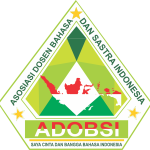Tarian Bonet: Kekayaan Budaya Suku Meto di Timor yang Terlupakan (Tinjauan Filsafat Nilai Max Scheler)
Abstract
This paper focuses on Max Scheler's value philosophy of the Bonet traditional dance originating from the Meto tribe in West Timor, East Nusa Tenggara. Bonet dance is a traditional dance full of meaning as a place to express praise and gratitude to the Almighty for the blessings and protection that the Meto people always receive in their lives. This traditional dance that is rich in meaning and philosophical value is gradually difficult to find again, because of the existence of modern Western dances such as Dancing and Dugem which are very popular and more desirable in Timor. The purpose of this paper is to find the values that exist in this dance from the point of view of Max Scheler's philosophy of value. In this writing, the author uses the library research method to support the validity of this scientific work. The values of Bonet dance in Max Scheler's perspective are divided into four parts, namely: The value of pleasure is the lowest level that has to do with the function of sensory feelings, which includes the satisfaction and happiness of the Meto people in performing Bonet dance; The value of vitality in this dance is the creation of harmony in the group of Meto people; The value of spirituality which consists of a combination of all components of music, dance movements, and costumes as a form of total self-giving to God; The value of sanctity is the value with the highest position in the form of an expression of deep gratitude to the Creator expressed by the Creator.
Keywords
Full Text:
PDFReferences
Andung, P. A. (2017). Media rakyat sebagai media komunikasi pembangunan masyarakat Suku Boti. Ilmu Komunikasi, 14(1), 277–293. DOI: https://doi.org/10.24002/jik.v14i2.870
Ataupah, H. (2020). Ekologi dan masyarakat: Kajian dan refleksi Atoin Meto di Timor Barat, NTT (G. Neonbasu, Ed.). Surabaya: CV. Sejahtera Mandiri Teknik Indonesia.
Banusu, Y. (2020). Korelasi makna tarian Bonet Masyarakat Dawan dengan konsep relasi Martin Buber (Sebuah study komparasi dengan pendekatan filosofis). Fides et Ratio, 5(2), 7-16. DOI: https://doi.org/10.47025/fer.v5i2.41
Bertens, K. (1983). Filsafat barat dalam abad XX. Jakarta: PT. Gramedia.
Frondizi, R. (1963). Que Son Los Valores, (terjemahan). USA: Solomon Lipp Publishing Company.
Hadiwijono, H. (1980). Sejarah filsafat barat 2. Yogyakarta: Kanisius.
Herwono. (2010). Jangan Melupakan Sejarah. Kompas. Diakses melalui https://nasional.kompas.com/read/2010/05/19/09083359/~Nasional
Hetharia, H. H. (2014). Filsafat hidup Siwalima dalam perspektif Aksiologi Max Scheler dan kontribusinya bagi penguatan karakter masyarakat multikultural di Maluku. Yogyakarta: Universitas Gajah Mada.
Iswanto. (2020). Tradisi lisan Natoni dalam tuturan ritual Sium Ana pada masyarakat Boti di Nusa Tenggara Timur. Jurnal Wakasuji Sejarah Dan Budaya, 11(1), 87-96. DOI: 10.36869/wjsb.v11i1.70 .
Kabelen, M. C. S. (2017). Fenomenologi nilai slametan masyarakat Yogyakarta dalam Perspektif Max Scheler. Design, 4(3), 249-264. DOI: http://dx.doi.org/10.30998/jurnaldesain.v4i03.1277
Kaelan, M. S. (2002). Filsafat Pancasila. Yogyakarta: Paradigma.
Liubana, M. M. J. (2021). Unsur kearifan lokal masyarakat Atoni Pah Meto dalam Legenda Oepunu. Onoma: Pendidikan, Bahasa Dan Sastra, 7(2), 449-461. DOI: https://doi.org/10.30605/onoma.v7i2.1287
Mae, R. M. (2017). Pengembangan model tarian Bonet untuk kebugaran jasmani dalam pembelajaran Penjasorkes di Sekolah Dasar. Jurnal Keolahragaan, 5(1), 81–89. DOI: https://doi.org/10.21831/jk.v5i1.12772
Muliyono, C. B. (2015). Kearifan lokal Pancasila: Butir-butir filsafat keindonesiaan (A. Riyanto, Ed.). Yogyakarta: Kanisius.
Neonbasu, G. (2013). Kebudayaan: Sebuah agenda dalam Bingkai Pulau Timor dan Sekitarnya. Jakarta: PT. Gramedia Pustaka Utama.
Neonbasu, G. (2021). Etnologi: Gerbang memahami Kosmos. Yogyakarta: Yayasan Pustaka Obor Indonesia.
Nitbani, S. (1994). Sastra lisan dawan. Jakarta: Pusat Pembinaan dan Pengembangan Bahasa Departemen Pendidikan dan Kebudayaan.
Nope, H. A., & Selan, M. (2021). Pemberdayaan tarian Adat Bonet pada masyarakat Atoni Pah Meto: Studi Kasus di Kecamatan Kota Soe, Kabupaten Timor Tengah Selatan, Provinsi Nusa Tenggara Timur. Hermeneutika, 7(2), 49-59. DOI: http://dx.doi.org/10.30870/hermeneutika.v7i2.12983
Purbadi, Y. D. (2010). Tata suku dan tata spasial pada arsitektur permukiman Suku Dawan di Desa Kaenbaun di Pulau Timor. Yogyakarta: Universitas Gadjah Mada.
Riyanto, A. (2011). Berfilsafat politik. Yogyakarta: Kanisius.
Scheler, M. (1866). Der Formalismus in der Ethik und die materiale Werthik, Gesamelte Werke. Publisher Francke: Original from the University of California.
Silab, W. (1997). Rumah tradisional Suku Bangsa Atoni, Timor, Nusa Tenggara Timur. Jakarta: Departemen Pendidikan dan Kebudayaan.
Usfinit, A. U. (2003). Maubes Insana: Salah satu masyarakat di Timor dengan struktur adat yang unik. Yogyakarta: Kanisius.
Wahana, P. (2004). Nilai etika aksiologis Max Scheler. Yogyakarta: Kanisius.
Wulandari, D. (2022). Nilai spiritual Tari Bedhaya Sekarjagad di Sanggar Pakarjawi Semarang. JOGED: Jurnal Seni Tari, 19(1), 35–49. DOI: https://doi.org/10.24821/Joged.V18i1.6969
Refbacks
- There are currently no refbacks.






